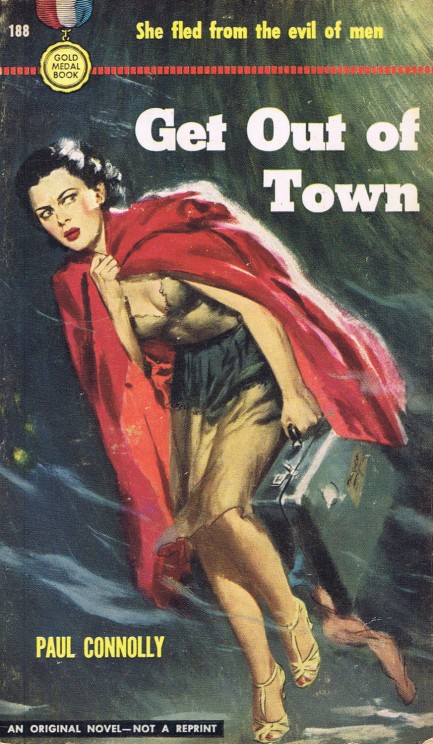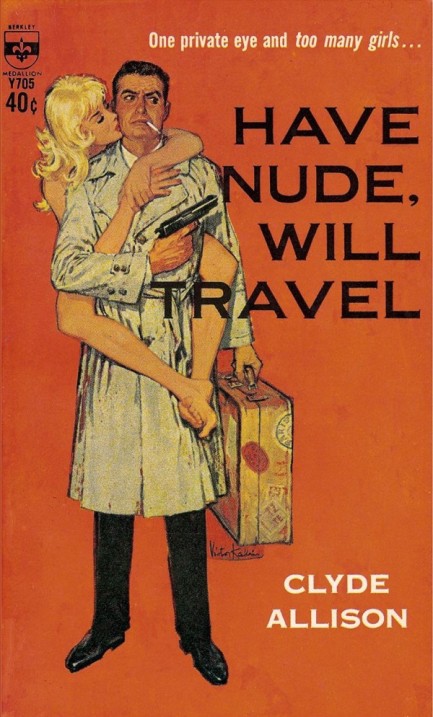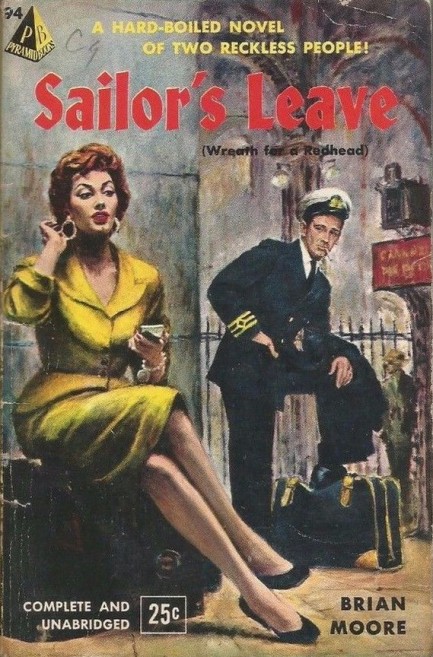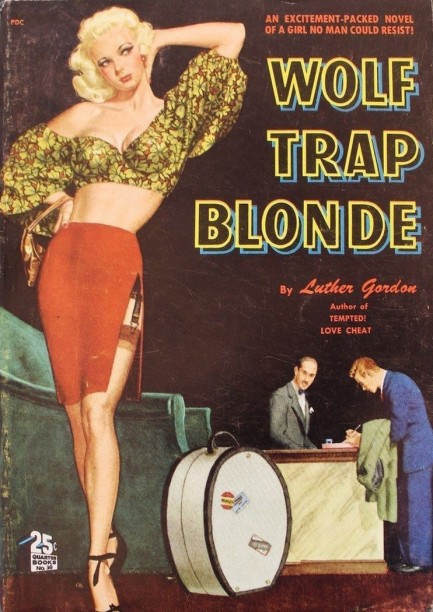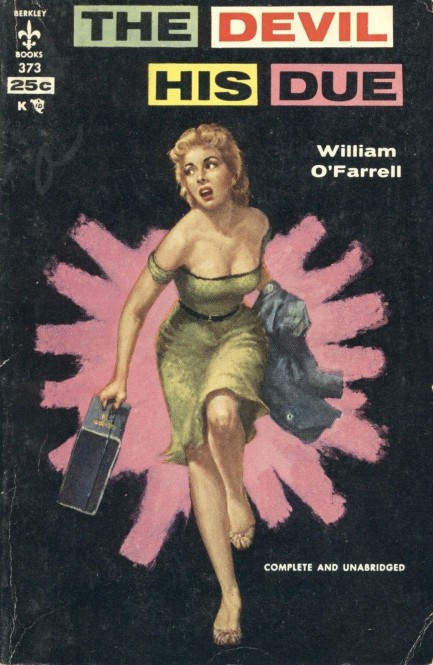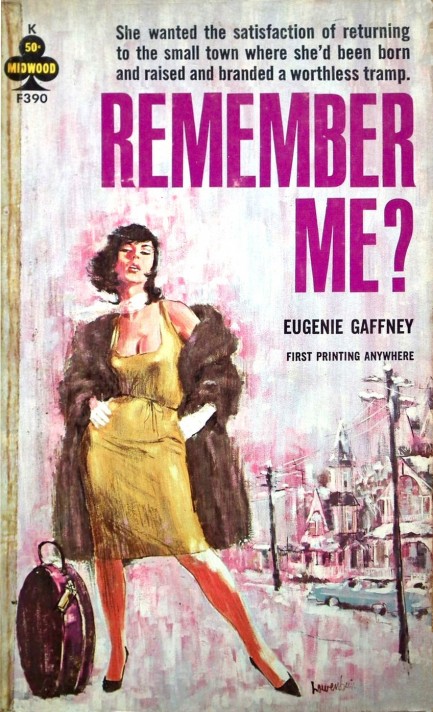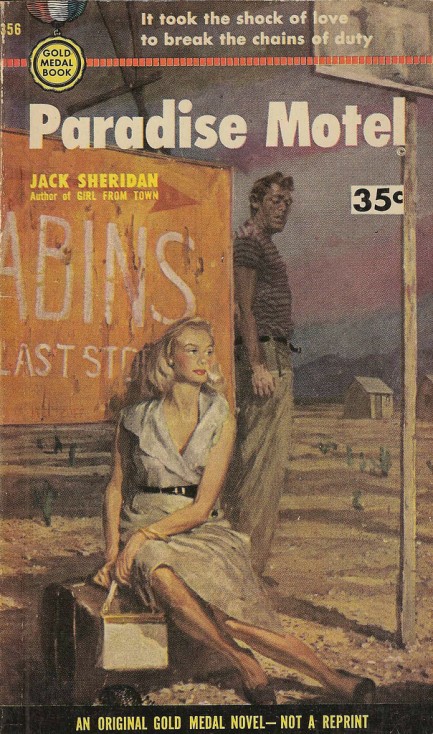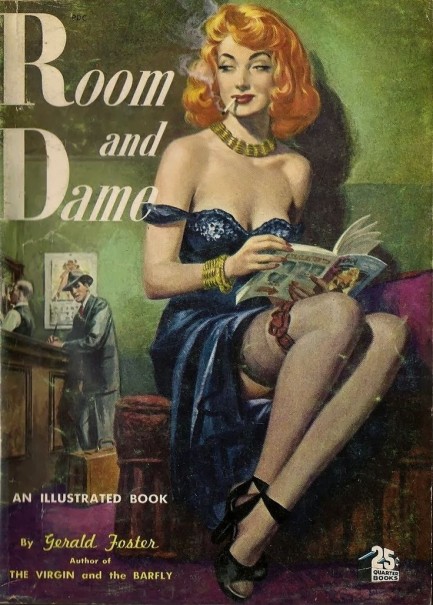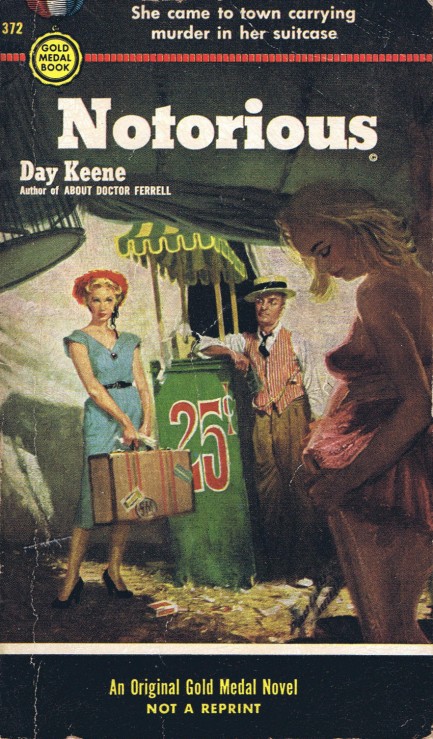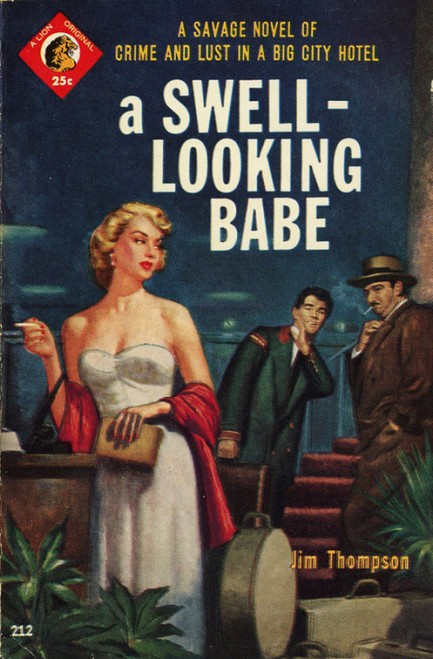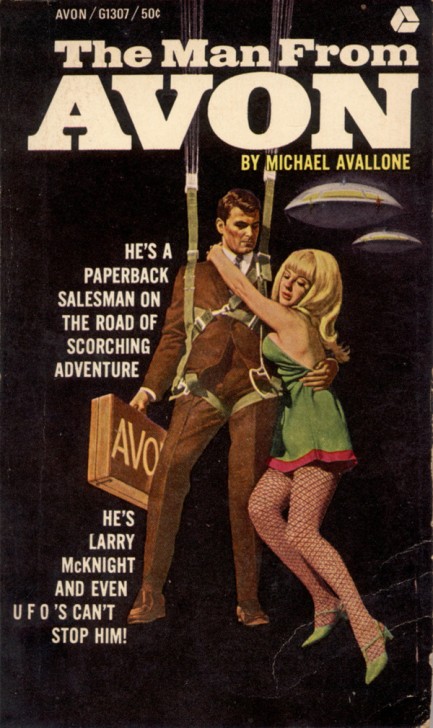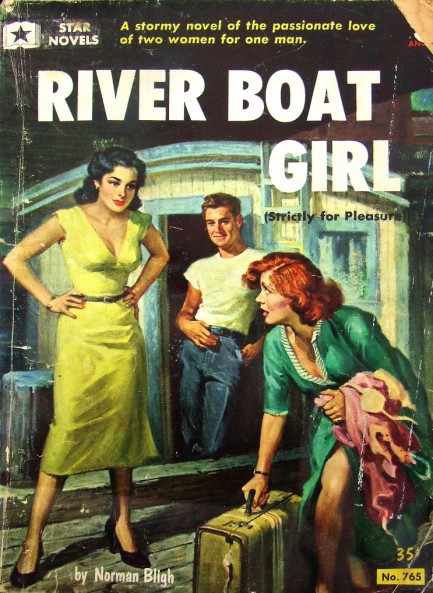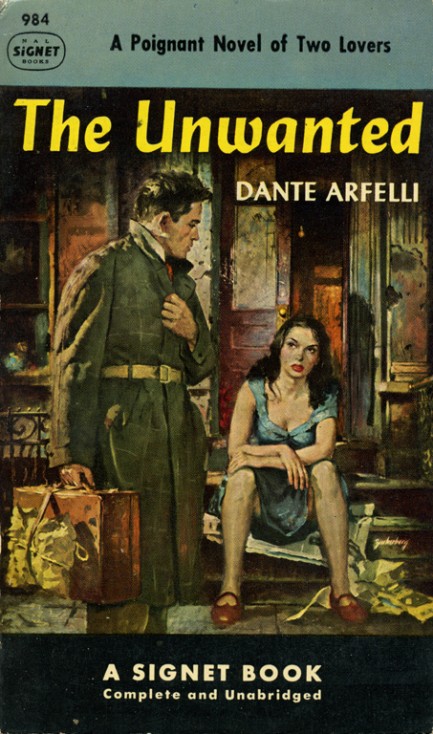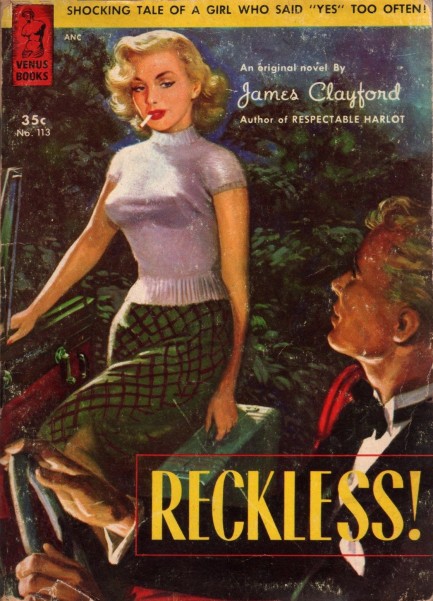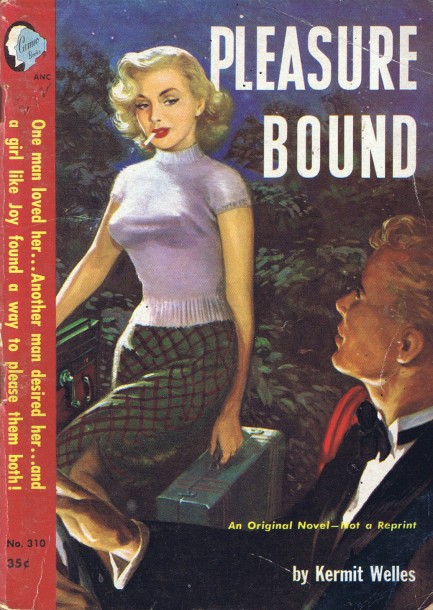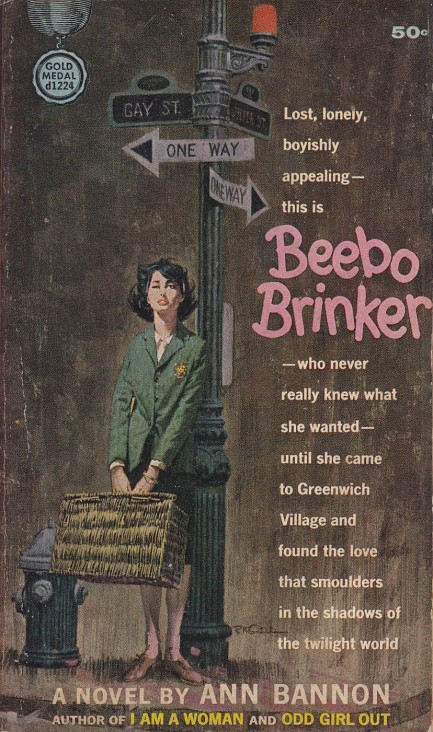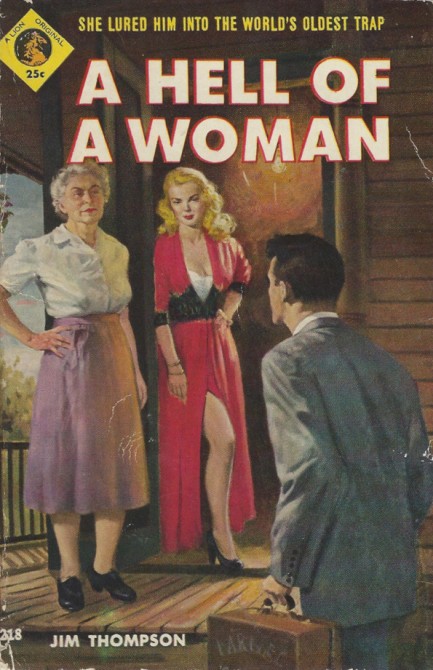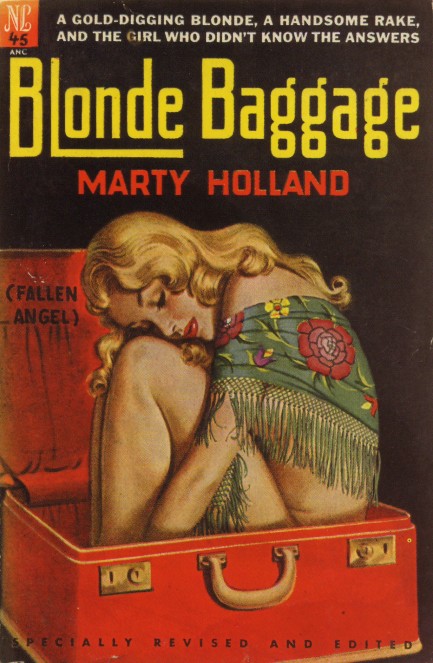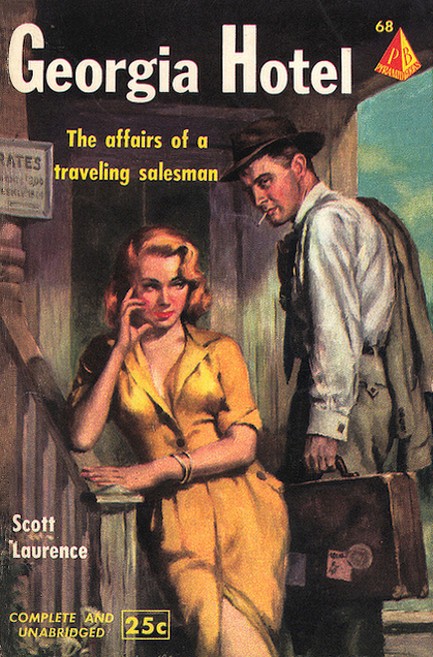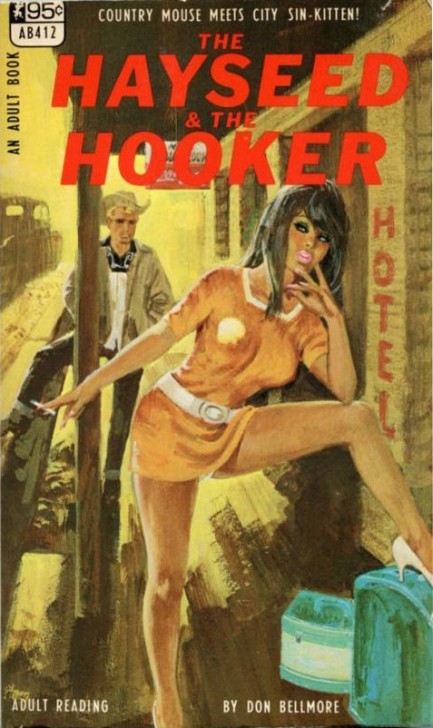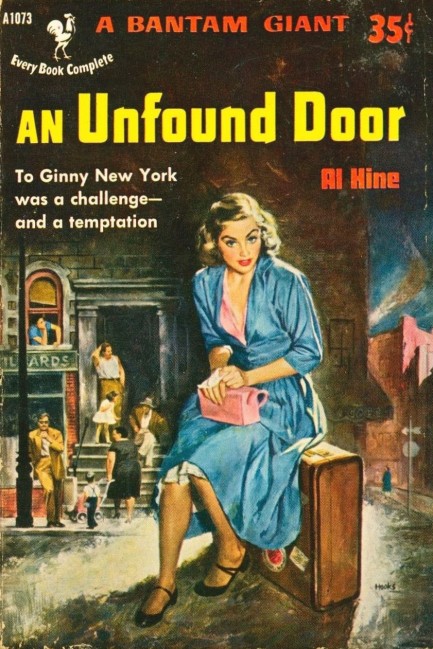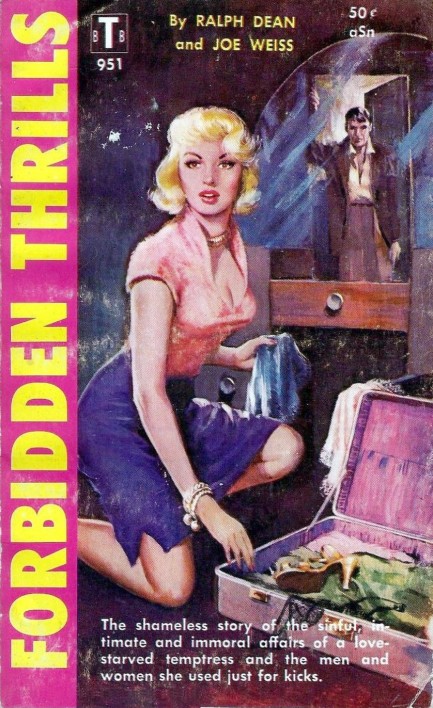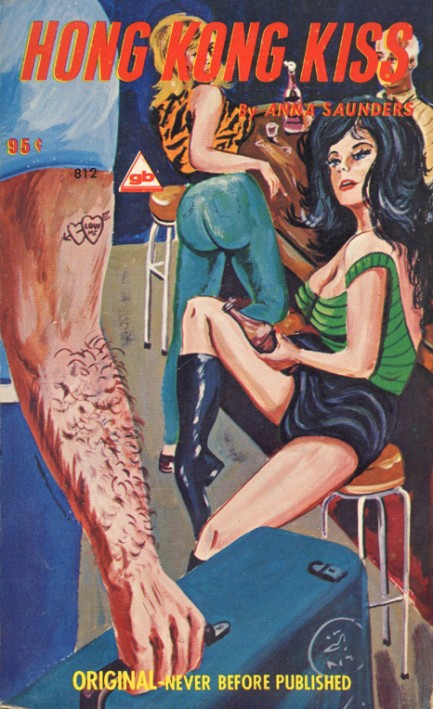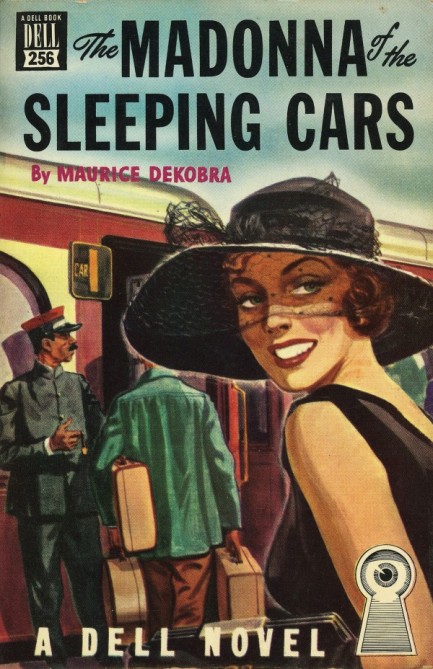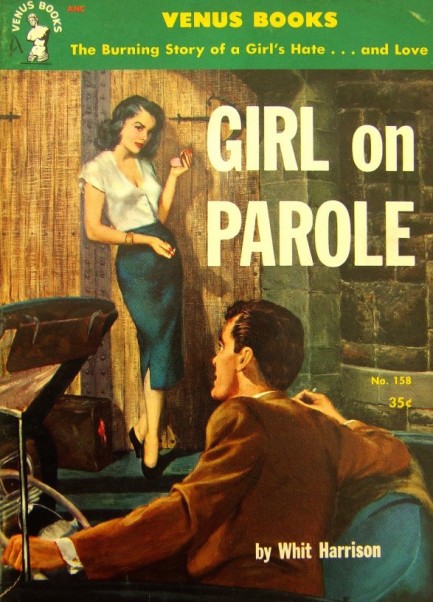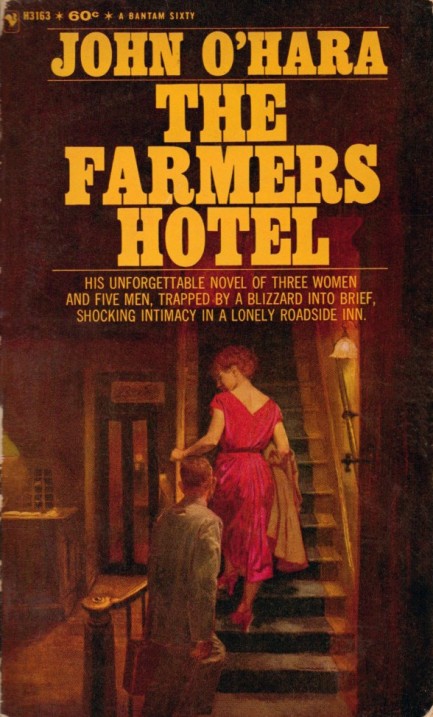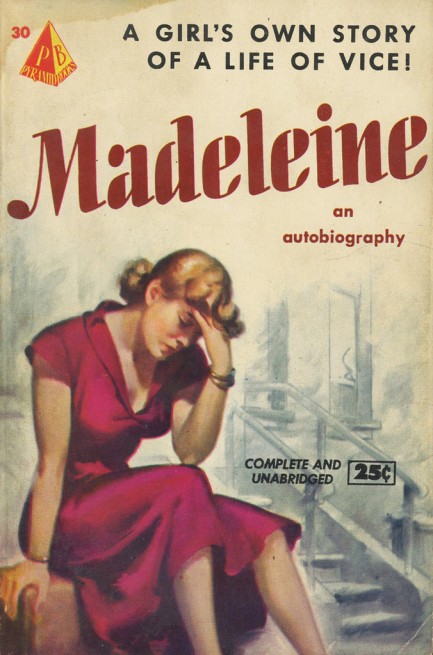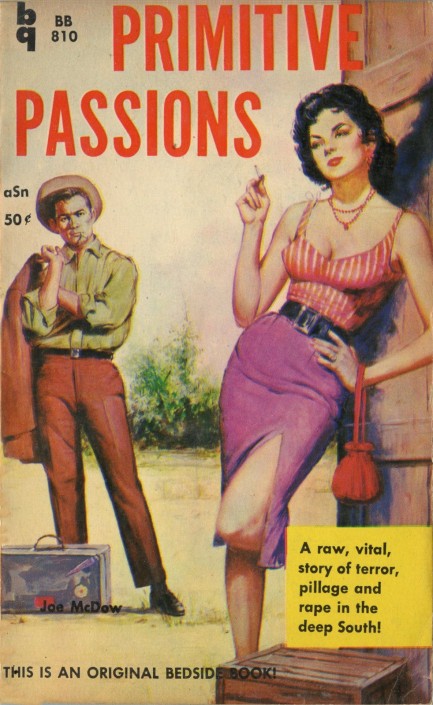 You know, you spend a lot of time looking in the mirror considering I'm dating you for your money. 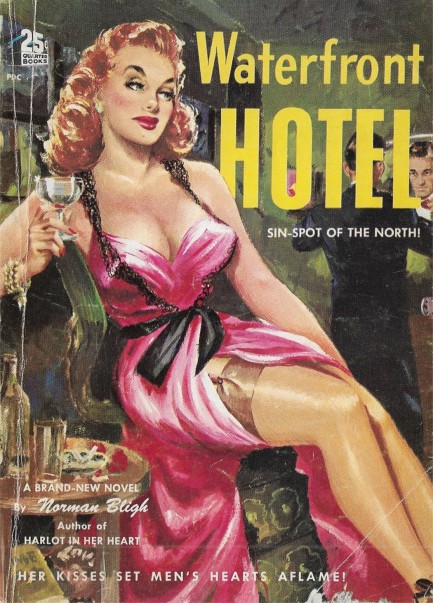
Above: an uncredited cover of a femme fatale and her preening man painted for Norman Bligh's 1950 novel Waterfront Hotel, about a woman named Brenda Seton who lives in a Maine cannery town and whose only ambition is to marry rich and move from the Flats to the Hill. Or perhaps not even marry. The owner of the cannery wants her for a mistress and is willing to pay in cash, house, and stock. Brenda might just accept the offer if she can't have her true love, local banker Bob Blaine, but because she's grasping, manipulative, and fake you know her plan will go pear-shaped. Just as crime doesn't usually pay in 1950s novels, neither does sex. It often—as in this case—leads to retribution from male characters via predictable means.
But there's one aspect of the book that isn't predictable—it has a couple of bizarre fights. Brenda's main rival Rhoda, who can throw knives with deadly effect, attacks Brenda, strips her naked, and makes her walk home through a driving rainstorm. Brenda gets her revenge during a fight in the cannery in which she disarms Rhoda, pins her prone, and slices her from neck to ass with her own knife. Cannery women—they'll cut a bitch. Is the book good? No. We think only a man would write a woman character who's forgiving about being raped, which happens to poor Brenda. Also, we never understood why her preferred epithet, uttered at least twenty times, was: Let him die! But we'll say this—Bligh conceived something a bit unusual here.
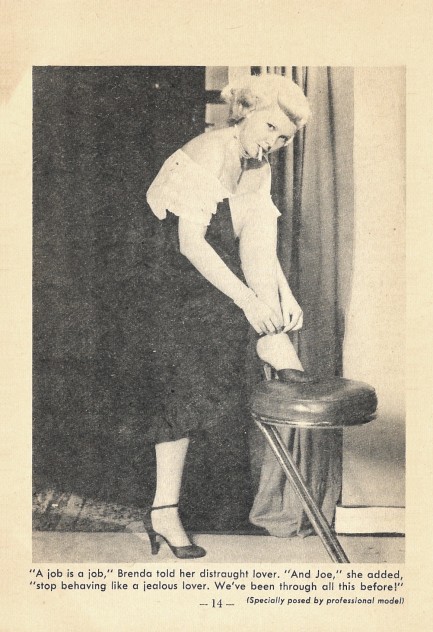 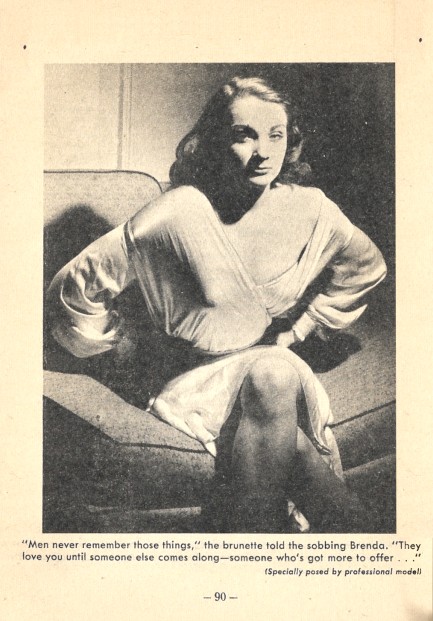 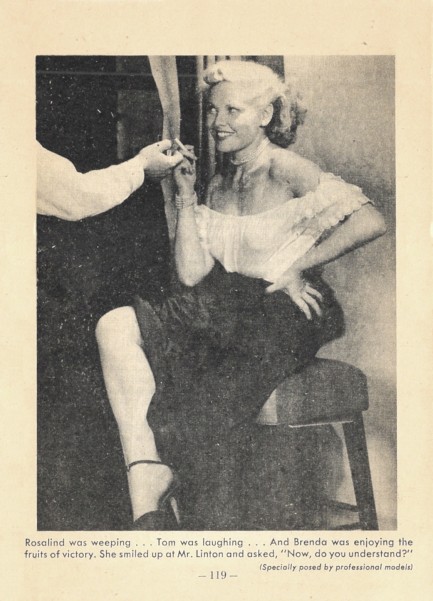 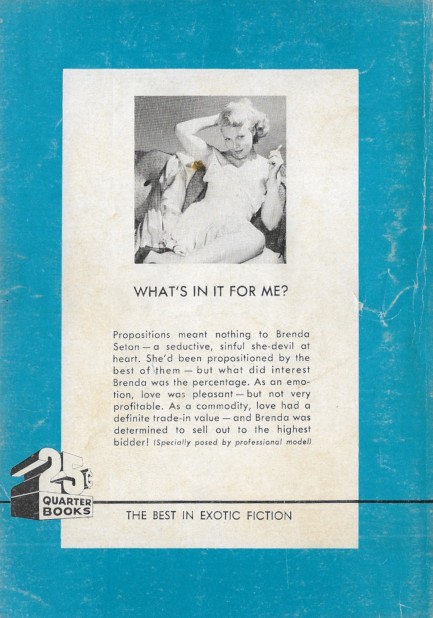
 When you little scamps get together you're worse than a sewing circle. 
Sex was her weapon! The line isn't about Uma Thurman. It comes from the cover of Harlot in Her Heart, the Norman Bligh novel she's holding in this promo shot made for her 1994 blockbuster hit Pulp Fiction. An interesting factoid about the movie is that it lost the Academy Award for best picture to a slice of saccharine nothingness called Forrest Gump thanks to a pathologically risk averse voter pool. It's an embarrasing miss for the Academy, because Pulp Fiction ranks as one of the most influential American movies ever. It took the disordered narrative structure that had been established in earlier films and elevated it to a new level. It borrowed the box-of-mystery gimmick that had already been turned on its head in movies like Kiss Me, Deadly and Belle du jour, and turned it on its head again. It incorporated a hip, ethnically mixed cast. It was funny as hell. And it placed Thurman at the center of its hyper-masculine narrative as the femme fatale Mia Wallace—who dug criminals, was tough-minded, graceful, impulsive, and smart. Her line about men being gossipy scamps was one of the best in the film. We can't imagine anyone else playing the role. As for Harlot in Her Heart, we may just buy it despite its exorbitant price. If so we reserve the right to use the cover again in a later post. 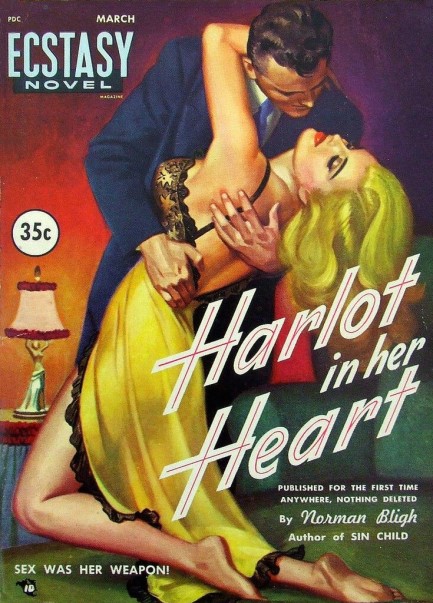
 Admit it—when I walked over and said I was going to sue your pants off you were really worried. 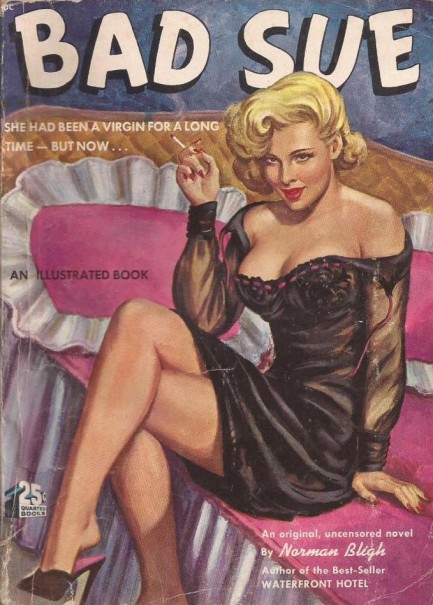 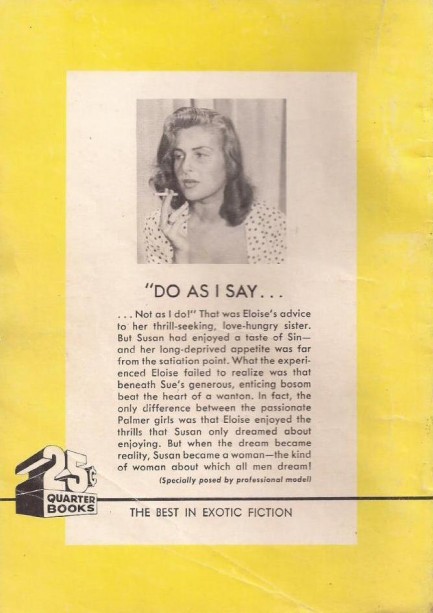
Above, a cover for Norman Bligh's novel Bad Sue, 1950, from Quarter Books. We've always thought this was an unusually pretty cover, but the artist is unknown.
 My pa shouldn't be back for hours. But just in case he does show up, do you prefer burial or cremation? 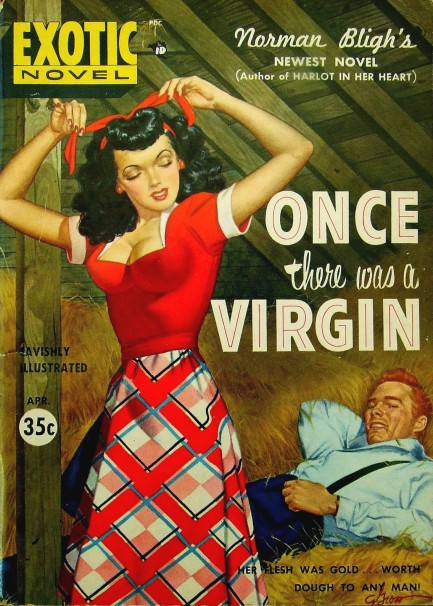 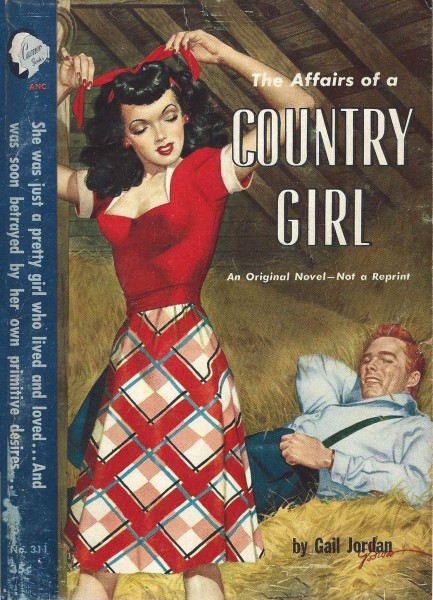
A double shot of rural sleaze today, Norman Bligh's Once There Was a Virgin, 1950 from Exotic Novels, and Gail Jordan's The Affairs of a Country Girl, 1952 from Cameo Books. George Gross provided the art for these covers, which are cropped differently, but between the two you see pretty much the entirety of the original piece. We think this is one of his better efforts. We're putting together a small collection of paperback covers set in barns and haylofts, so consider this a preview, along with the covers here, here, and here.
 Can I interest you in a quick hay ride? 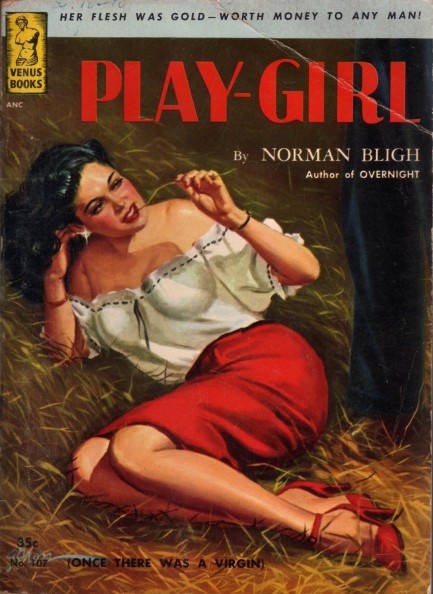
Above, another installment of art from the great George Gross, with cover work for Norman Bligh's Play-Girl, 1950, from Venus Books. See more here and here.
 Forget my wife—I think I need help regaining sensation in my lower half. 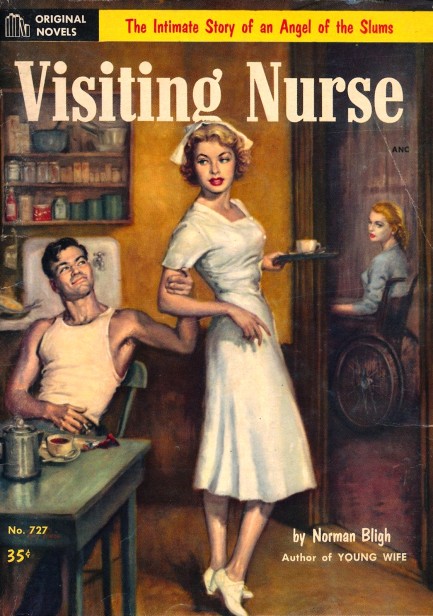
Nursing isn’t easy—especially in mid-century fiction, where in addition to dealing with medical issues you have to dodge the roaming hands of doctors and patients alike. Visiting Nurse, written by Norman Bligh, aka William Neubauer, deals with an angel of mercy sent into the slums who finds herself giving the fellas some unconventional treatments. Why? Because “she has all the weaknesses and yearnings of women, the need to be loved, the aching desires, the mad impulses” and because “she tries and tries again, yet cannot help making mistakes, cannot help the fact that she is a woman.” At this point, we'd note that the weaknesses and yearnings of men have reduced entire countries to parking lots, but that would be a digression. 1953 copyright, with cover art by Ray Pease.
 Baby, you are something special. And to imagine I once thought a quality spread only referred to the stock market. 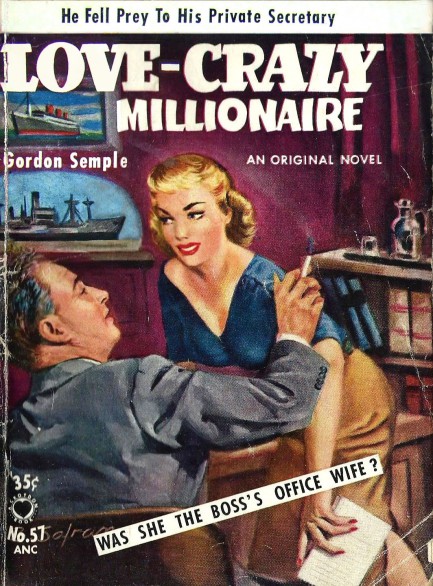
They say money can’t buy love, but it can certainly buy a reasonable facsimile. That’s not our opinion—that’s empirical reality. It works even if you’re even as old as this guy. Gordon Semple, aka William Neubauer, Norman Bligh, et al., explores the theme of love-for-money in Love-Crazy Millionaire, as a rich man gets tangled up with a woman who’s decided it’s time to get ahead in life. It comes from Croydon Publishing Company, and the excellent cover art is by Bernard Safran, who we need to feature more often. 1954 copyright on this. And now, the top 20 financial terms that sound sexual but aren’t: 20: Backup withholding 19: Tender offer 18: Liquidity put 17: Horizontal acquisition 16: Gypsy swap 15: Usufruct 14: 30-day wash rule 13: In-service withdrawal 12: Leptokurtosis 11: Open position 10: Jointly and severally 9: Receipt of deposit 8: Underperformance 7: Pump and dump 6: Naked straddle 5: Escheat period 4: Fallout risk 3: W-type bottom 2: Front-end load 1: Endowment
 So I thought I’d wear something really sexy for you this evening and we could— Wait, what’s burning? 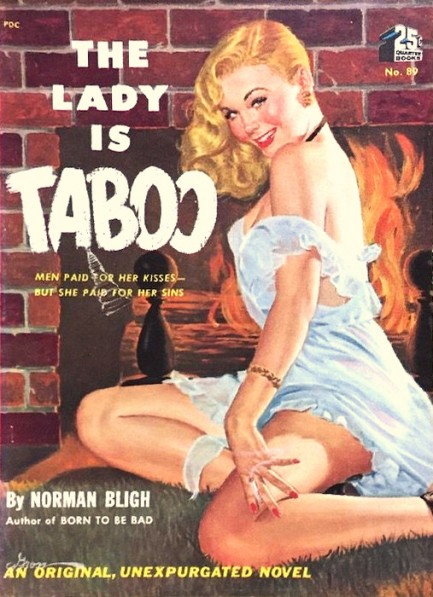
Nothing kills romance like having to throw water over your flaming girlfriend. On the one hand you’d have saved her life. On the other, you'd spend the next decade hearing, “I honestly think you enjoyed drenching me.” Luckily that scenario doesn’t actually happen in The Lady Is Taboo. Instead it deals with a woman who believes she’s gotten sexually involved with a killer. Norman Bligh wrote it for Quarter Books in 1951, and the cover art is by the always wonderful George Gross.
 I’ll go through it one more time for you. Mine are b’s, but there are also a’s, c’s, d’s, double-d’s... 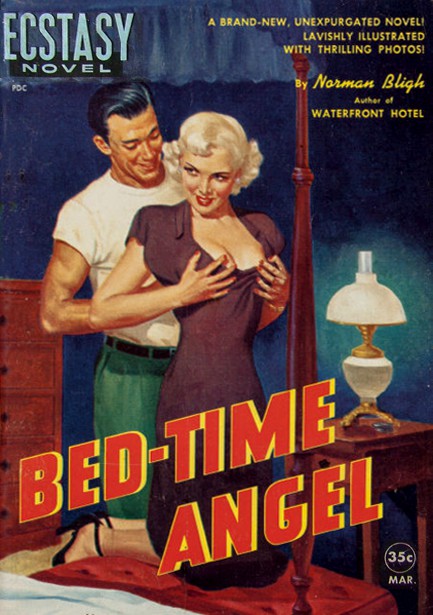 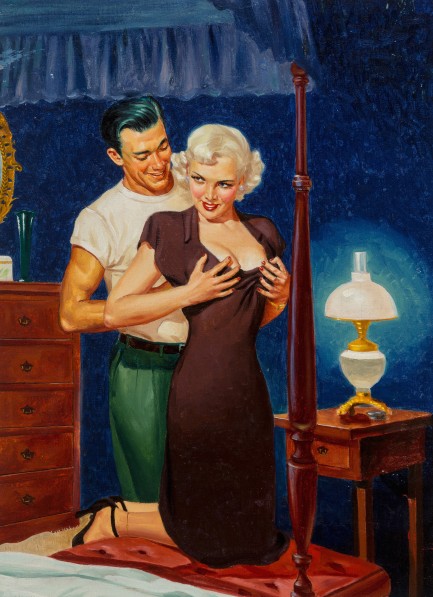
Above, an excellent George Gross cover, plus the original art, for Bed-Time Angel written by Norman Bligh, aka William Arthur Neubauer, for Ecstasy Novel Magazine, March 1951.
|
 |

The headlines that mattered yesteryear.
2003—Hope Dies
Film legend Bob Hope dies of pneumonia two months after celebrating his 100th birthday. 1945—Churchill Given the Sack
In spite of admiring Winston Churchill as a great wartime leader, Britons elect
Clement Attlee the nation's new prime minister in a sweeping victory for the Labour Party over the Conservatives. 1952—Evita Peron Dies
Eva Duarte de Peron, aka Evita, wife of the president of the Argentine Republic, dies from cancer at age 33. Evita had brought the working classes into a position of political power never witnessed before, but was hated by the nation's powerful military class. She is lain to rest in Milan, Italy in a secret grave under a nun's name, but is eventually returned to Argentina for reburial beside her husband in 1974. 1943—Mussolini Calls It Quits
Italian dictator Benito Mussolini steps down as head of the armed forces and the government. It soon becomes clear that Il Duce did not relinquish power voluntarily, but was forced to resign after former Fascist colleagues turned against him. He is later installed by Germany as leader of the Italian Social Republic in the north of the country, but is killed by partisans in 1945.
|

|
|

It's easy. We have an uploader that makes it a snap. Use it to submit your art, text, header, and subhead. Your post can be funny, serious, or anything in between, as long as it's vintage pulp. You'll get a byline and experience the fleeting pride of free authorship. We'll edit your post for typos, but the rest is up to you. Click here to give us your best shot.

|
|


















